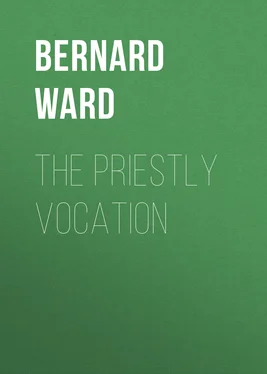Bernard Ward - The Priestly Vocation
Здесь есть возможность читать онлайн «Bernard Ward - The Priestly Vocation» — ознакомительный отрывок электронной книги совершенно бесплатно, а после прочтения отрывка купить полную версию. В некоторых случаях можно слушать аудио, скачать через торрент в формате fb2 и присутствует краткое содержание. Жанр: foreign_prose, foreign_religion, Философия, foreign_psychology, foreign_antique, на английском языке. Описание произведения, (предисловие) а так же отзывы посетителей доступны на портале библиотеки ЛибКат.
- Название:The Priestly Vocation
- Автор:
- Жанр:
- Год:неизвестен
- ISBN:нет данных
- Рейтинг книги:3 / 5. Голосов: 1
-
Избранное:Добавить в избранное
- Отзывы:
-
Ваша оценка:
- 60
- 1
- 2
- 3
- 4
- 5
The Priestly Vocation: краткое содержание, описание и аннотация
Предлагаем к чтению аннотацию, описание, краткое содержание или предисловие (зависит от того, что написал сам автор книги «The Priestly Vocation»). Если вы не нашли необходимую информацию о книге — напишите в комментариях, мы постараемся отыскать её.
The Priestly Vocation — читать онлайн ознакомительный отрывок
Ниже представлен текст книги, разбитый по страницам. Система сохранения места последней прочитанной страницы, позволяет с удобством читать онлайн бесплатно книгу «The Priestly Vocation», без необходимости каждый раз заново искать на чём Вы остановились. Поставьте закладку, и сможете в любой момент перейти на страницу, на которой закончили чтение.
Интервал:
Закладка:
There can be no doubt that the work of Cardinal Manning was successful, in that he raised the tone and work of the secular clergy in a marked degree. And his work had a certain reflection outside his diocese, especially in the north, where the traditions of Dr. Newsham at Ushaw were still fresh. It is true that neither there nor after Cardinal Manning's time in London, has the full exclusiveness which he introduced been maintained. Missions and Retreats are fitly given by religious not only because they have more leisure to give to a proper preparation, but also because the holiness of their lives will often react upon the success of their work. The very fact of their being outside the ordinary parochial life is often an advantage for a mission. People confess to them more readily. But the idea that a secular priest is by his state unfit for such work may be said to be dead, and from time to time, as occasion offers, we find them bearing their share of it. The expression "only a secular priest" has passed from out our vocabulary, and the old-fashioned depreciation of the secular clergy is almost a thing of the past.
CONFERENCE II
IT was pointed out in the last Conference that the root of the evil of the depreciation of the secular clergy in the past, was the idea, in which they seemed to acquiesce, that their vocation was similar to that of the Regulars; but that not being religious, they were on a lower plane and could live with less high ideals and aspirations. The true fact, however, is that the two vocations are radically and essentially different. Each has its own special sphere of work in the Church, and if properly lived up to, they will not clash, but will supplement each other.
Consider this one point. The secular clergy are trained and ordained for the one special object of parochial or pastoral work; whereas in the case of the regulars, such work is only incidental and secondary. Many—in some countries the majority—never do it at all; and in the case of those who do, it is limited both in quality and amount by the demands of the rule and traditions of their particular Order or Congregation.
It is true indeed that in this country in the penal days and after, a large amount of missionary work was done by the regulars under conditions not very dissimilar to those under which the seculars were working. The English Benedictines became practically a missionary congregation, and remained such until almost within living memory: but this was due to the stress of the times. At an ordinary Benedictine monastery the monks give themselves to a life of prayer and study, and to singing the Divine Office in choir, only a few of them doing any parochial or missionary work, and that always in subservience to their monastic life.
Let it be admitted if so desired that, in itself, this vocation is higher than that of the secular clergy; for it makes the sanctification of him who receives it the first and chief concern, to which any work which he may undertake must be subordinate. In that way it becomes the highest possible state of life, for it fulfils our Lord's test, 3 3 St. Matt. xix. 21.
"If thou wilt be perfect, go sell what thou hast and give to the poor, and thou shalt have a treasure in heaven, and come, follow Me." The traditional interpretation given by the Church to the well-known text, "Mary hath chosen the best part," 4 4 St. Luke x. 42.
indicates the greater dignity of the contemplative over the active life.
Many religious orders, however, especially the modern congregations, were not founded for the contemplative life in this strict sense, but rather for carrying out some active work of a specific nature, which could be combined with the religious life. The Society of Jesus was founded for special educational and other work; the Redemptorists were intended for giving missions to the uninstructed poor of the country districts; and similarly with others. Such Congregations will adapt themselves, so far as they can, to altered conditions, and will often undertake work such as was not exactly contemplated by their founders; but they will always regulate the amount which they undertake by the consideration of the limitations of their rule and the number of their subjects available, their general principle being that no member must be given work which either in degree or in kind would interfere with his own religious life, for that is the primary object of his vocation. For every one of them is bound to aim at perfection, which is of the essence of his state.
This consideration is so important as to be an excuse for quoting at some length a portion of a well-known letter of Cardinal Wiseman in which he urges it. When he first came to London as Bishop in 1847, and saw the amount of work among the poor that was calling out to be done, and the utter inadequacy of the secular clergy in point of numbers to cope with it, he conceived the idea of putting much of it as special work into the hands of the religious Congregations, who were then settling in London: but he found in every case that their missionary activities were strictly limited both as to quantity and quality. We can quote his own words:— 5 5 Life of Wiseman, ii. p. 116.
"1. The Jesuits have a splendid church, a large house, several priests, besides Westminster. 6 6 i.e. The old Jesuit mission in Romney Terrace, afterwards Horseferry Road, now absorbed in the Cathedral parish. The letter was written on October 27, 1852.
Scarcely was I settled in London, than I applied to their Superior to establish here a community in due form, of some ten or twelve fathers. I also asked for missionaries to give retreats to congregations, etc. I was answered on both heads, that dearth of subjects made it impossible. Hence we have under them, only a church which, by its splendour, attracts and absorbs the wealth of two parishes, but maintains no schools and contributes nothing towards the education of the poor at its very door. . . .
"2. The Redemptorists came to London as a missionary Order, and I cheerfully approved of and encouraged their coming. When they were settled down, I spoke to them of my cherished plan of missions to and among the poor. I was told that this was not the purpose of their institute in towns, and that 'another Order would be required for what I wanted.' The plea of 'rule' is one which I have all along determined to respect; and I had no more to say. They have become, so far as London is concerned, a parochial body, taking excellent care of Clapham, having five or six priests and abundant means for it. . . .
"3. The Passionists I brought first to England, in consequence of having read what their founder felt for it, and of a promise I made to Father Dominic years before I got them placed at Aston Hall, and thence they have spread. In consequence it was decreed that the principal house should be in London when I came to it. . . . They have never done me a stroke of work among the poor. . . .
"4. The Marists I brought over for a local purpose, and they are answering well. I hope for much good from them in Spitalfields, but, at least at present, I dare not ask them about general work.
"5. And now, last, I come to the institute of which I almost considered myself a member, San Filippo's Oratory. I have never omitted an opportunity of expressing my thankfulness to God for its establishment here, and for the many graces it has brought with it, in the piety it has diffused, and the many it has converted. But as a matter of fact, you know that external work, the work I have been sighing for, is beyond its scope.
"You know" (he continues) "how rigidly I have respected 'rule,' how I never thought of forcing a parish on you, how I have refrained from asking cooperation, even a sermon, because I would ask for nothing which I understood to be incompatible with the Institute's purpose. . . . Two things I have always respected in the case of all Orders, vocation and rule ."
Читать дальшеИнтервал:
Закладка:
Похожие книги на «The Priestly Vocation»
Представляем Вашему вниманию похожие книги на «The Priestly Vocation» списком для выбора. Мы отобрали схожую по названию и смыслу литературу в надежде предоставить читателям больше вариантов отыскать новые, интересные, ещё непрочитанные произведения.
Обсуждение, отзывы о книге «The Priestly Vocation» и просто собственные мнения читателей. Оставьте ваши комментарии, напишите, что Вы думаете о произведении, его смысле или главных героях. Укажите что конкретно понравилось, а что нет, и почему Вы так считаете.












